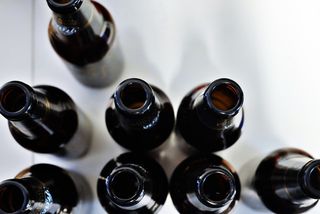Alcoholism
Impacts of Social Isolation and Stress on Problem Drinking
Alcoholism can be a slippery slope during this time of social distancing.
Posted April 20, 2020 Reviewed by Lybi Ma
These are stressful times—for all of us. Many of us are worried about our own health and the health of our friends, our families, and our coworkers. Thousands of Americans are stressed about finances, asking themselves, “Will I be able to pay my rent?” “Can I afford to buy groceries? Diapers? Gas for the car?”
People who are used to reporting in person for work may not know what to do with their time at home and are feeling lonely and uninspired. They are getting cabin fever, having had their fill of Netflix and Hulu and the latest YouTube video on their feed.
Under stressful circumstances, some may feel the urge to drink—or even participate in virtual cocktail hours with their telecommuting coworkers—when boredom or tension strikes. Turning to alcohol or other drugs during times of stress is a common—but maladaptive—coping mechanism. In a study reported in the American Journal of Epidemiology, there was an almost 25 percent increase in alcohol consumption in the weeks following the 9/11 terrorist attacks. And in a similar study by the American Journal of Drug and Alcohol Abuse, there was a 17.5 percent increase in alcohol use nine months after the 9/11 attacks, compared to the month prior to the attacks.
The stress of the current pandemic, with recommendations for self-quarantine and social distancing—and the likelihood that these measures will be in place for weeks and possibly months—represents an even greater risk to those individuals who are prone to problem drinking or vulnerable to alcohol use disorder and other addictions.
If you do not have a history of addiction, and you are a social drinker, you may be at higher risk for problem drinking and negative consequences from alcohol or other substances during this time of social isolation. Do your find your cocktail hour being bumped up to the late afternoon—or even earlier? Do you find that bottle of wine that used to last three days now barely making it to the second night?

Alcoholism can be a slippery slope. As a way of self-monitoring, it is important to know the CDC’s definition of “heavy” or “excessive” drinking. If you are a male, excessive drinking is defined as 15 or more alcoholic drinks in one week and more than 5 drinks at one time. If you are a female, the definition is 8 or more alcoholic beverages in one week and 4 alcoholic drinks per occasion.
In assessing for alcoholism, we often use the four-question CAGE tool:
1. Have you ever felt you should CUT DOWN on your alcohol use?
2. Have people ANNOYED you by criticizing your drinking?
2. Have you ever felt bad or GUILTY about your drinking?
4. Have you ever needed an EYE-OPENER, a first drink in the morning to steady your nerves or stop shaking?
It is a difficult thing to accept that you may have a problem or may need help. Also, if you are drinking excessively and daily, stopping cold turkey may lead to serious withdrawal symptoms, including seizures or delirium tremens. Some may require a medically monitored detox program to safely stop drinking alcohol and/or consuming other addictive substances.
Many addiction treatment programs, both detox and residential treatment, remain open during this COVID-19 pandemic. I have seen firsthand how mental health professionals have mobilized to deliver care, both in-person and virtually, to those who are most vulnerable, and to encourage those who think they may have a problem to seek out the resources available to them.
With disrupted routines and fewer distractions, now is the time to confront strengths and identify areas for improvement. If this global pandemic has made anything clear, it is that we all need to seize the day and prioritize helping ourselves—and each other.
